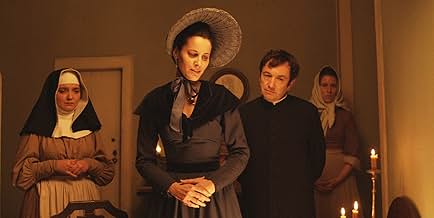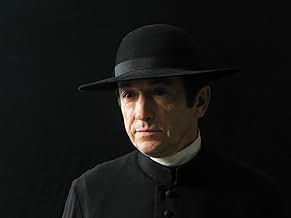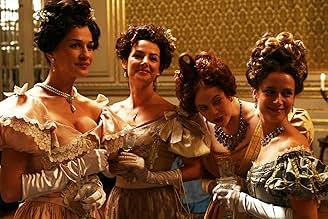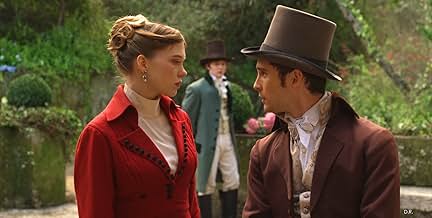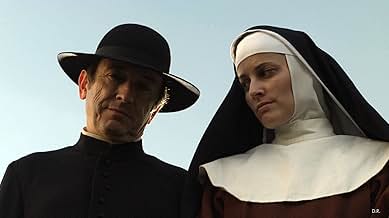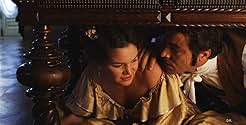IMDb RATING
7.4/10
3.7K
YOUR RATING
Follows a jealous countess, a wealthy businessman, and a young orphaned boy across Portugal, France, Italy and Brazil where they connect with a variety of mysterious individuals.Follows a jealous countess, a wealthy businessman, and a young orphaned boy across Portugal, France, Italy and Brazil where they connect with a variety of mysterious individuals.Follows a jealous countess, a wealthy businessman, and a young orphaned boy across Portugal, France, Italy and Brazil where they connect with a variety of mysterious individuals.
Browse episodes
Featured reviews
Mistérios de Lisboa is shown in the United States with the title Mysteries of Lisbon (2010). The film is directed by the extraordinary Chilean director, Raoul Ruiz. Ruiz, who died in 2011, had directed 115 films. (Not a typo--one hundred and fifteen.)
The film is based on a novel by the Portuguese author Camilo Castelo Branco. (Unfortunately, the novel isn't available in English translation.) It's also frustrating that the DVD available in the U.S. is a shortened version of the original miniseries. (266 minutes vs. 360 minutes. What was left out of the shorter version?)
The film is hard to describe because there are stories within stories within stories. The basic plot--more or less--revolves around a boy attending a Catholic school in early 19th Century Portugal. The boy doesn't know the identity of his mother and father. He doesn't even know his last name.
We eventually meet his mother, her husband, and--in flashback--his father. We also meet elegant women in sumptuous gowns, men for whom dueling is a way of life, and endless numbers of servants who are always watching and listening.
Some mysteries are never resolved. For example, there's a young woman who is the mistress of one of the nobles. When he dies, she refuses to accept any of his inheritance. She turns up again as the wife of an extremely wealthy, cruel man. Then she disappears from the plot. (Was her story edited out, or did she just disappear?)
Ultimately, I think the key to the plot is the priest Padre Dinis, played extremely well by Adriano Luz. He--like almost all of the the characters--turns out to have a surprising past.
Other IMDb reviewers have commented on the costumes, which are incredibly attractive. Two main characters who appear in those costumes are Maria João Bastos as a Portuguese noblewoman and Clotilde Hesme as a French noblewoman. Both of them are extremely beautiful in a European, non-Hollywood way. They appear to have been born to wear those costumes.
At the very end of the movie the young man, now grown, encounters some beggars. One of them tells him, "With the nobility, it's all about their honor. We poor people know these things happen, and we take them as part of life." When I thought about it, those sentences encompasses Mysteries of Lisbon. Nobles fight duels and spend endless effort and resources to protect the honor of their family. One man goes so far as to order the killing of his grandchild, because the child is born out of wedlock. Huge events are taking place around them--the Napoleonic wars, the Portuguese civil war--but what really matters is their rigid code of honor.
We saw this movie on DVD, and it worked well enough. However, almost every frame of the film would be a beautiful still. Many scenes look like lush paintings--Baroque, rather than 19th Century. That's why I believe the film would work better on the large screen. However, if no screening is available, buy the DVD. It's not a movie you want to miss!
The film is based on a novel by the Portuguese author Camilo Castelo Branco. (Unfortunately, the novel isn't available in English translation.) It's also frustrating that the DVD available in the U.S. is a shortened version of the original miniseries. (266 minutes vs. 360 minutes. What was left out of the shorter version?)
The film is hard to describe because there are stories within stories within stories. The basic plot--more or less--revolves around a boy attending a Catholic school in early 19th Century Portugal. The boy doesn't know the identity of his mother and father. He doesn't even know his last name.
We eventually meet his mother, her husband, and--in flashback--his father. We also meet elegant women in sumptuous gowns, men for whom dueling is a way of life, and endless numbers of servants who are always watching and listening.
Some mysteries are never resolved. For example, there's a young woman who is the mistress of one of the nobles. When he dies, she refuses to accept any of his inheritance. She turns up again as the wife of an extremely wealthy, cruel man. Then she disappears from the plot. (Was her story edited out, or did she just disappear?)
Ultimately, I think the key to the plot is the priest Padre Dinis, played extremely well by Adriano Luz. He--like almost all of the the characters--turns out to have a surprising past.
Other IMDb reviewers have commented on the costumes, which are incredibly attractive. Two main characters who appear in those costumes are Maria João Bastos as a Portuguese noblewoman and Clotilde Hesme as a French noblewoman. Both of them are extremely beautiful in a European, non-Hollywood way. They appear to have been born to wear those costumes.
At the very end of the movie the young man, now grown, encounters some beggars. One of them tells him, "With the nobility, it's all about their honor. We poor people know these things happen, and we take them as part of life." When I thought about it, those sentences encompasses Mysteries of Lisbon. Nobles fight duels and spend endless effort and resources to protect the honor of their family. One man goes so far as to order the killing of his grandchild, because the child is born out of wedlock. Huge events are taking place around them--the Napoleonic wars, the Portuguese civil war--but what really matters is their rigid code of honor.
We saw this movie on DVD, and it worked well enough. However, almost every frame of the film would be a beautiful still. Many scenes look like lush paintings--Baroque, rather than 19th Century. That's why I believe the film would work better on the large screen. However, if no screening is available, buy the DVD. It's not a movie you want to miss!
Mysteries of Lisbon in my view is utterly mesmerising, and one of those rare cases where there is no bad thing about it. As an adaptation of the novel, it succeeds wonderfully, on its own terms it is even more impressive. Mysteries of Lisbon may be lengthy at just over four and a half hours. But because everything was so well done, there was not a single moment where I was not transfixed.
On a visual standpoint, Mysteries of Lisbon looks amazing. The photography is gorgeous complete with beautiful-looking scenery and costumes, while there is an atmospheric and striking colour palette. The music does a fine job in conveying the mood of each scene, with not one scene feeling musically out of place.
Mysteries of Lisbon also benefits from a brilliant story. There are several story lines developed (very well) and incorporated throughout, but the main crux of the story told here is so unique and compelling it drew me in immediately. The script is of exceptional quality, often very moving, literate and thoughtful, while the characters have a complexity while being intriguing as well.
When it comes to the acting, there is not a single bad performance, Luz especially in the lead is fantastic. And throughout the direction is superb. Overall, this is mesmerising and highly recommended. 10/10 Bethany Cox
On a visual standpoint, Mysteries of Lisbon looks amazing. The photography is gorgeous complete with beautiful-looking scenery and costumes, while there is an atmospheric and striking colour palette. The music does a fine job in conveying the mood of each scene, with not one scene feeling musically out of place.
Mysteries of Lisbon also benefits from a brilliant story. There are several story lines developed (very well) and incorporated throughout, but the main crux of the story told here is so unique and compelling it drew me in immediately. The script is of exceptional quality, often very moving, literate and thoughtful, while the characters have a complexity while being intriguing as well.
When it comes to the acting, there is not a single bad performance, Luz especially in the lead is fantastic. And throughout the direction is superb. Overall, this is mesmerising and highly recommended. 10/10 Bethany Cox
At four and one-half hours, this is the longest movie I have seen in quite some time. The length will most definitely detract many (as would the costumes and subtitles) from ever sitting down to view this; but I think those with patience and appreciation of "epic"/sweeping storytelling might like this one.
This is the story of Joao, a young orphaned boy (he discovers he's actually a bastard as the story unfolds) living in a Catholic orphanage under the watchful, caring eye of Father Denis. Joao learns of his parentage and where they came from and their circumstances ... and as those stories unfold we learn of different characters in THOSE stories as well.
The film spirals and sweeps and sways with several tangents and characters; but I found it all interesting and actually wanted to continue watching. That each of the stories intertwine and circle each other is part of the "mystery" of the title and parts of the film act and feel as if the entire production is a dream.
It is lovely to look at (gorgeous costumes and sets) and each of the characters has a revelation that continues the "mystery" and the intrigue and drama. The story travels from the streets of Lisbon to Venice to France to Tunis and to Brazil ... it is SWEEPING on a grand-scale as it also spans three decades.
Based on the late author, Camilo Castelo Branco's (who shot himself at the age of 70 b/c he was going blind) novel of the same name, Chilean director Raoul Ruiz has given us his final film (it is masterful) as he died shortly before the film began screening. That it is all so tragic and doomed and romantic is fitting ... as that is exactly what the movie gives its viewer.
I know none of my friends will give this one a shot ... it does require patience. But it is a beauty.
This is the story of Joao, a young orphaned boy (he discovers he's actually a bastard as the story unfolds) living in a Catholic orphanage under the watchful, caring eye of Father Denis. Joao learns of his parentage and where they came from and their circumstances ... and as those stories unfold we learn of different characters in THOSE stories as well.
The film spirals and sweeps and sways with several tangents and characters; but I found it all interesting and actually wanted to continue watching. That each of the stories intertwine and circle each other is part of the "mystery" of the title and parts of the film act and feel as if the entire production is a dream.
It is lovely to look at (gorgeous costumes and sets) and each of the characters has a revelation that continues the "mystery" and the intrigue and drama. The story travels from the streets of Lisbon to Venice to France to Tunis and to Brazil ... it is SWEEPING on a grand-scale as it also spans three decades.
Based on the late author, Camilo Castelo Branco's (who shot himself at the age of 70 b/c he was going blind) novel of the same name, Chilean director Raoul Ruiz has given us his final film (it is masterful) as he died shortly before the film began screening. That it is all so tragic and doomed and romantic is fitting ... as that is exactly what the movie gives its viewer.
I know none of my friends will give this one a shot ... it does require patience. But it is a beauty.
The Mysteries of Lisbon are not so much mysteries as they are a series of conversations which always lead to some sort of revelation. These revelations are melodramatic punch lines with interlocking characters continuously finding out who their parents are, where they came from, the results of lost loves, and everything in between. If the script was written in a linear fashion with no time jumps or flashbacks, there would be no mysteries; it would just be a meandering retelling of Romeo and Juliet (and all of their cousins).
The word meandering sounds harsh and an indictment of a script which does not know where it is going. However, I mean meandering as in there are multiple lead characters to follow and each of them has a very complicated past which takes its time to tell. The Mysteries of Lisbon is four and a half hours long; the director threw out accepted norms for audience patience in favor of showing the whole story. It is based on an 1854 novel by the Portuguese author Camilo Castelo Branco and it appears it was filmed in an unabridged fashion.
The main character is a village priest, Padre Denis (Adriano Luz), who at first is indirectly involved in a couple's forbidden love affair and then purposefully injects himself into their lives and then into everyone else's life who comes into contact with their troubles. Even though the priest is the interconnecting cog in the middle of all of these characters, he is not the narrator. That role is given to an orphan the priest looks after and becomes a driving force of his own later on.
The director, Raul Ruiz, obviously loves conversations, but only deep and emotionally scarring ones. Every conversation or recounting of a previous conversation has its own 30 minute segment it seems. The characters, usually just two, sit in a room and then the scene fades into flashback on what happened in the past which will now illuminate the present. I believe the time shifts were included to create the mystery. The author deliberately created the tension of not knowing and the 'a-ha' discovery moments because he could not have accomplished the same moments with a realistic, linear timeline.
The action is mostly set in Portugal and appears to be in the early 1800s but after Napoleon. The Emperor is frequently referenced but only in the past tense. Many of the characters are nobles so the costume designer had a true feast in outfitting so many people in remarkable period dress. The Portuguese scenery and elaborate set designs are also enjoyable; somebody really took their time to make the set look intensely real. The lighting is also employed to convey a sense of realness. There seems to be no artificial lighting whatsoever. Light only comes through windows during the day and the rooms are terrifically dark at night. The candles never flicker so there must be some source of artificiality, but it is not noticeable. Unfortunately, Raul Ruiz recently passed away on 19 August. He was Chilean born but left Chile in 1973 when Augusto Pinochet took power. The Mysteries of Lisbon is his final film and is of such epic proportions it appears he was thinking about this film for a long time before he finally took the plunge.
I recommend this film, but be careful. Watch it only if you appreciate long, intense scenes of dialogue or appreciate the intricate details of period films. There is extremely little action and drawn out sequences with no words spoken at all; however, there is character with the endearing name 'Knife Eater'. If these aspects do not scare you, then sit back and enjoy because you are in for a real treat. You will not see a film like this from an American director; no studio would ever sign off on a movie this long, not if they expect it to make any money.
The word meandering sounds harsh and an indictment of a script which does not know where it is going. However, I mean meandering as in there are multiple lead characters to follow and each of them has a very complicated past which takes its time to tell. The Mysteries of Lisbon is four and a half hours long; the director threw out accepted norms for audience patience in favor of showing the whole story. It is based on an 1854 novel by the Portuguese author Camilo Castelo Branco and it appears it was filmed in an unabridged fashion.
The main character is a village priest, Padre Denis (Adriano Luz), who at first is indirectly involved in a couple's forbidden love affair and then purposefully injects himself into their lives and then into everyone else's life who comes into contact with their troubles. Even though the priest is the interconnecting cog in the middle of all of these characters, he is not the narrator. That role is given to an orphan the priest looks after and becomes a driving force of his own later on.
The director, Raul Ruiz, obviously loves conversations, but only deep and emotionally scarring ones. Every conversation or recounting of a previous conversation has its own 30 minute segment it seems. The characters, usually just two, sit in a room and then the scene fades into flashback on what happened in the past which will now illuminate the present. I believe the time shifts were included to create the mystery. The author deliberately created the tension of not knowing and the 'a-ha' discovery moments because he could not have accomplished the same moments with a realistic, linear timeline.
The action is mostly set in Portugal and appears to be in the early 1800s but after Napoleon. The Emperor is frequently referenced but only in the past tense. Many of the characters are nobles so the costume designer had a true feast in outfitting so many people in remarkable period dress. The Portuguese scenery and elaborate set designs are also enjoyable; somebody really took their time to make the set look intensely real. The lighting is also employed to convey a sense of realness. There seems to be no artificial lighting whatsoever. Light only comes through windows during the day and the rooms are terrifically dark at night. The candles never flicker so there must be some source of artificiality, but it is not noticeable. Unfortunately, Raul Ruiz recently passed away on 19 August. He was Chilean born but left Chile in 1973 when Augusto Pinochet took power. The Mysteries of Lisbon is his final film and is of such epic proportions it appears he was thinking about this film for a long time before he finally took the plunge.
I recommend this film, but be careful. Watch it only if you appreciate long, intense scenes of dialogue or appreciate the intricate details of period films. There is extremely little action and drawn out sequences with no words spoken at all; however, there is character with the endearing name 'Knife Eater'. If these aspects do not scare you, then sit back and enjoy because you are in for a real treat. You will not see a film like this from an American director; no studio would ever sign off on a movie this long, not if they expect it to make any money.
This series of short stories set in a world long gone is of course a costume drama, that may therefore deter some. They would be mistaken. It is slow, considered, colorful and in my view a good introduction to the world of our ancestors, who held opinions different from ours, did things in a different way, and got upset about the same issues, yet in a different clothing. Love that is thwarted, wise padres, noble families with poor youngest children and all of that in a heavily draped world - sometimes a bit much. And yet I may recommend that you sit down, do not hurry, leave your perhaps preconceived ideas at the entrance, and enjoy these so many hours of romantic stories.
Did you know
- GoofsThe movie is set during the late 1700's to early 1800's. During the ballroom scene, several shots make it obvious that the gowns worn by the women have zippers in the back but the zipper wasn't invented until 1851.
- Alternate versionsAlso exists as a shorter (by about an hour), theatrically released, feature film version, Mysteries of Lisbon (2010).
- ConnectionsEdited from Mysteries of Lisbon (2010)
- How many seasons does Mysteries of Lisbon have?Powered by Alexa
Details
- Release date
- Countries of origin
- Official sites
- Languages
- Also known as
- Лісабонські таємниці
- Filming locations
- Production companies
- See more company credits at IMDbPro
Contribute to this page
Suggest an edit or add missing content



